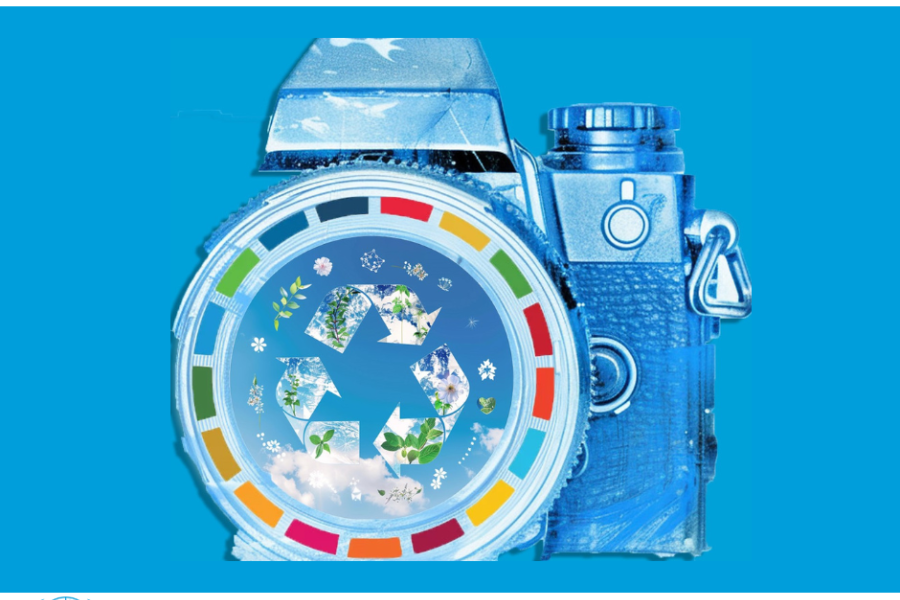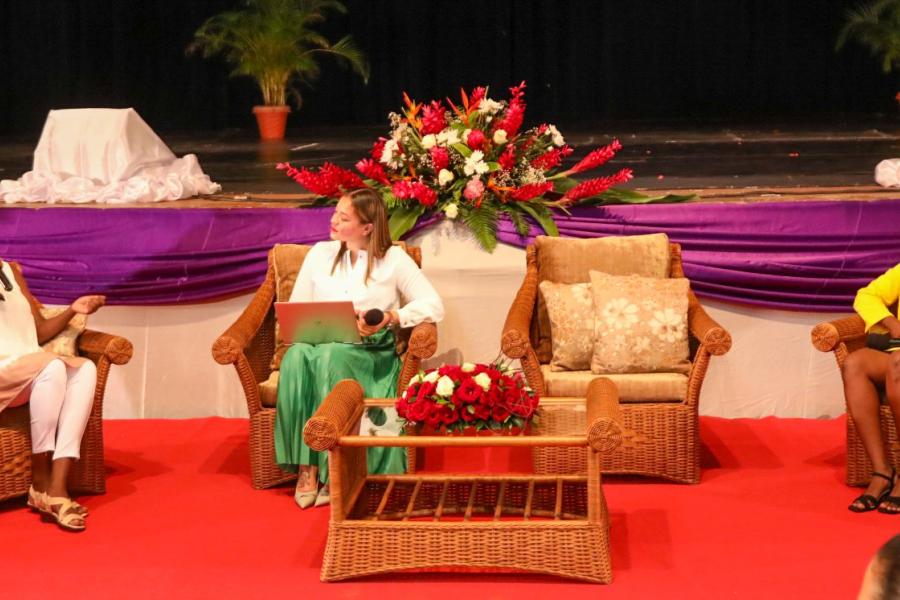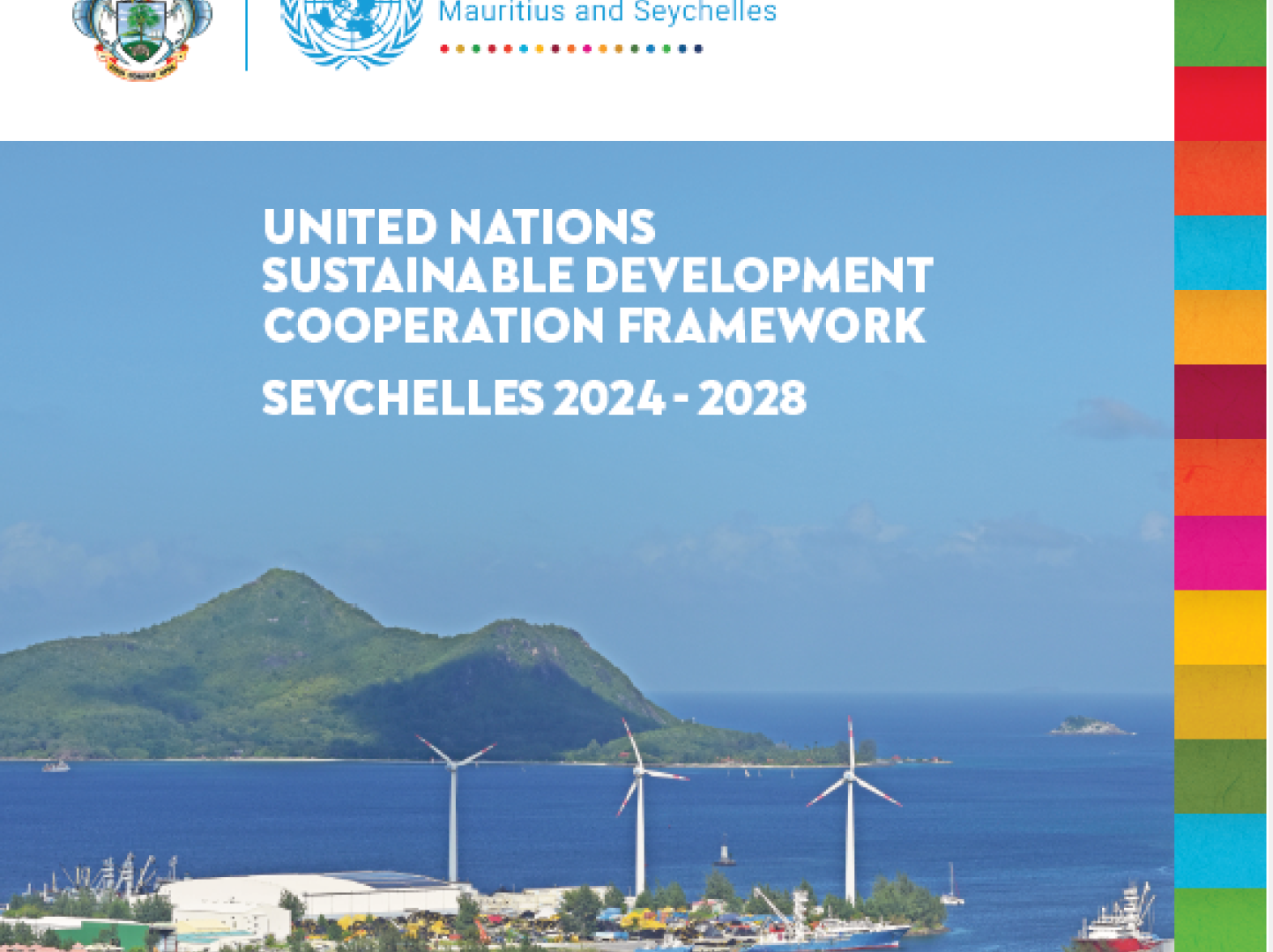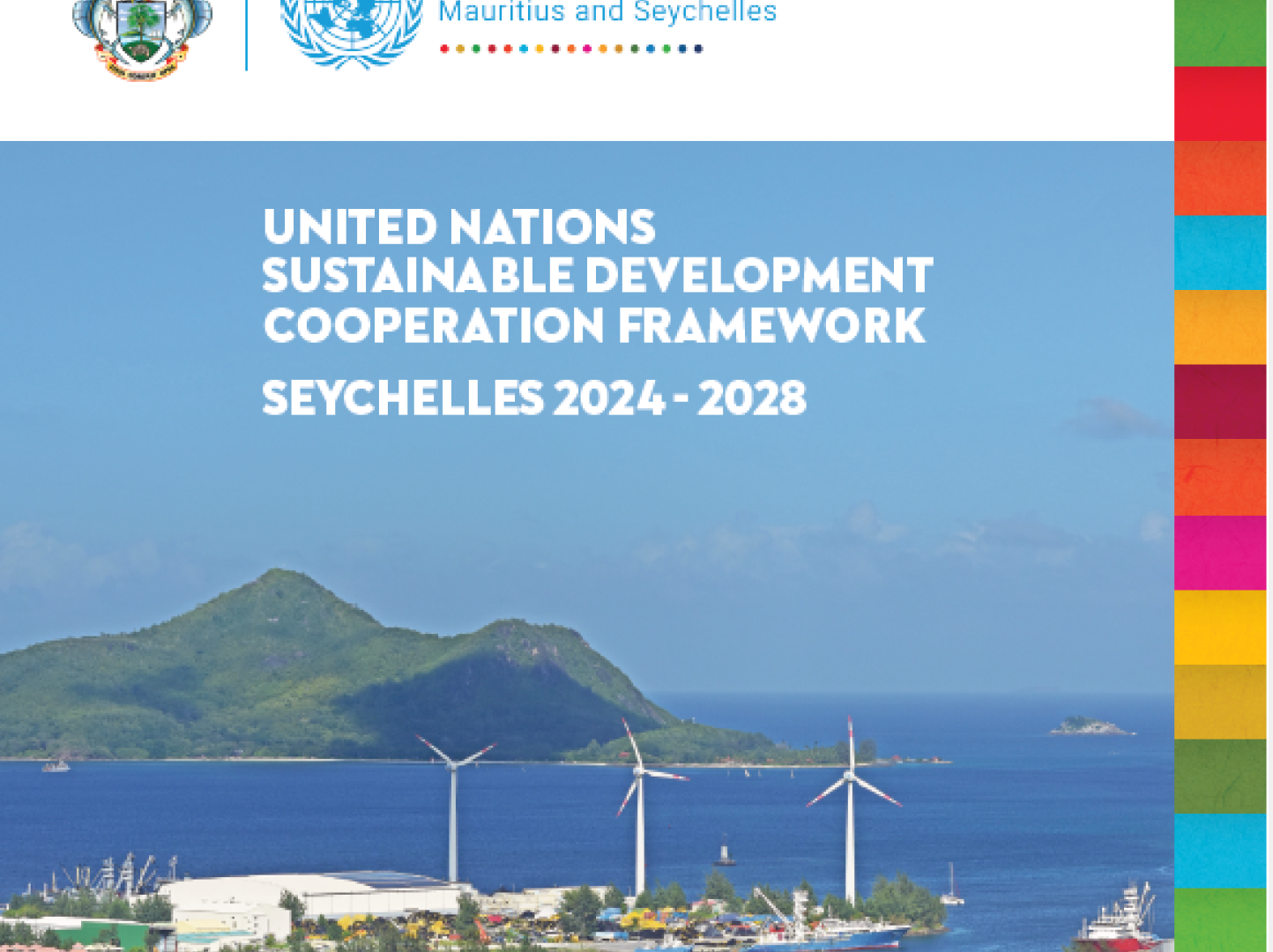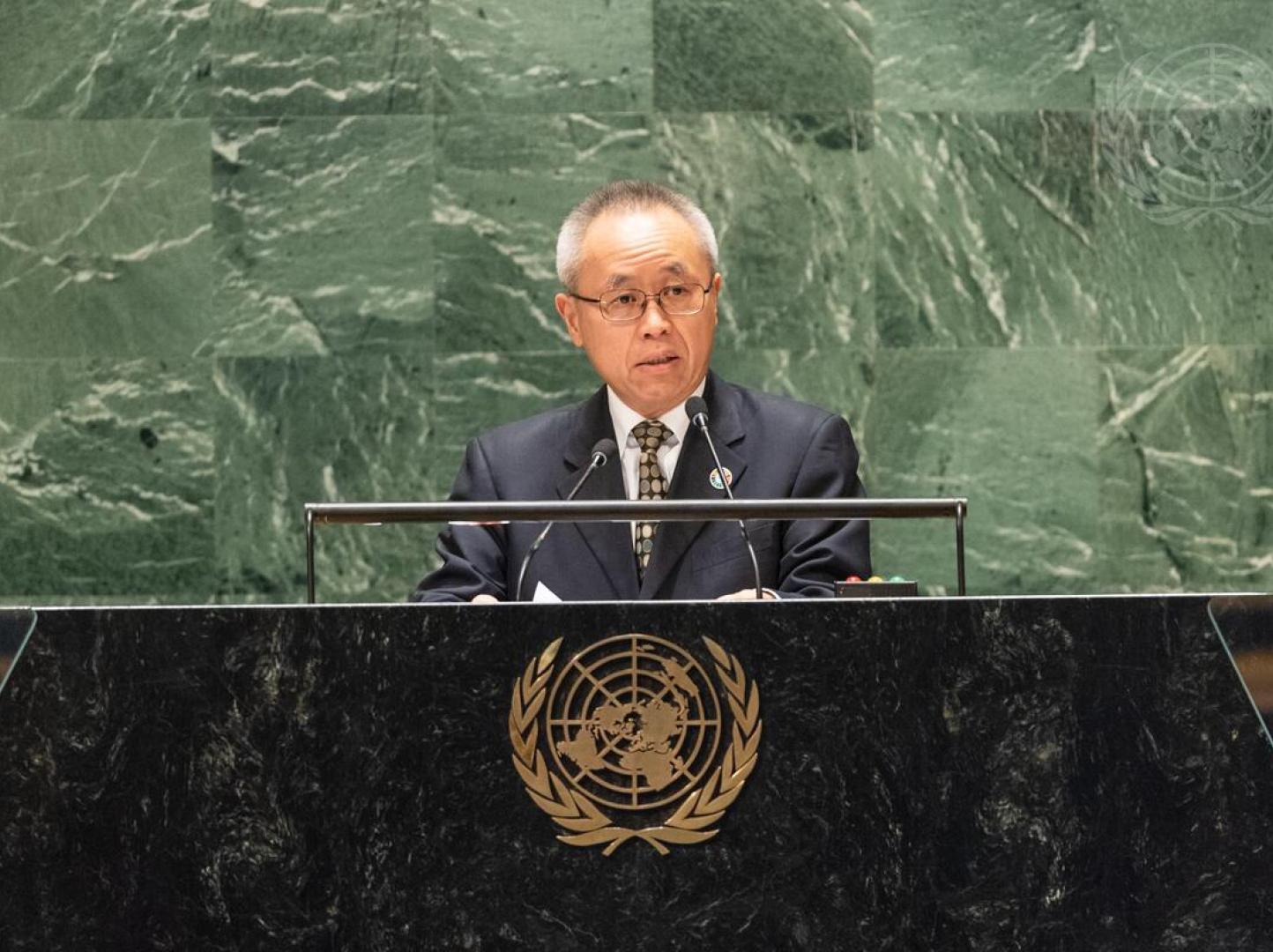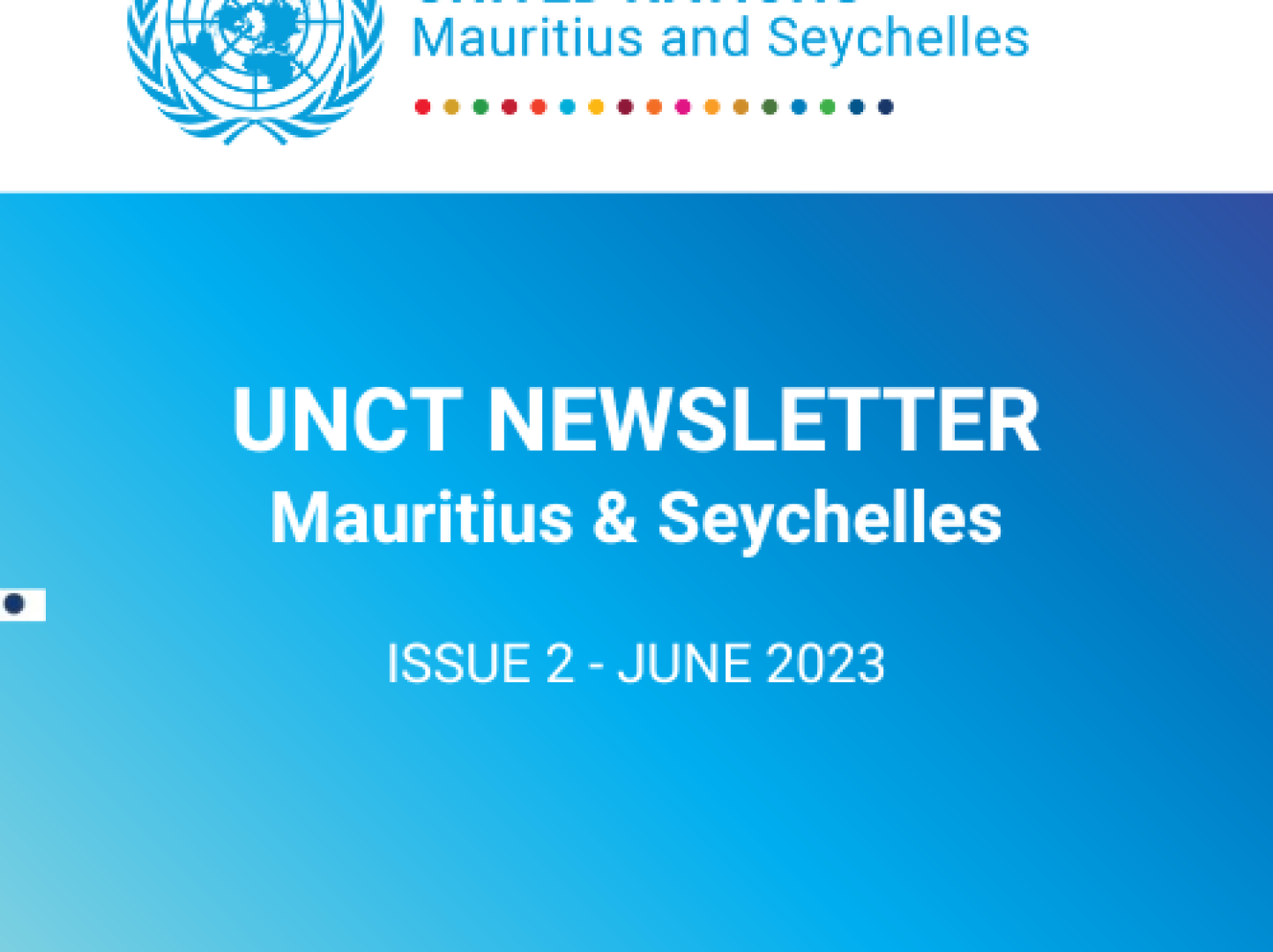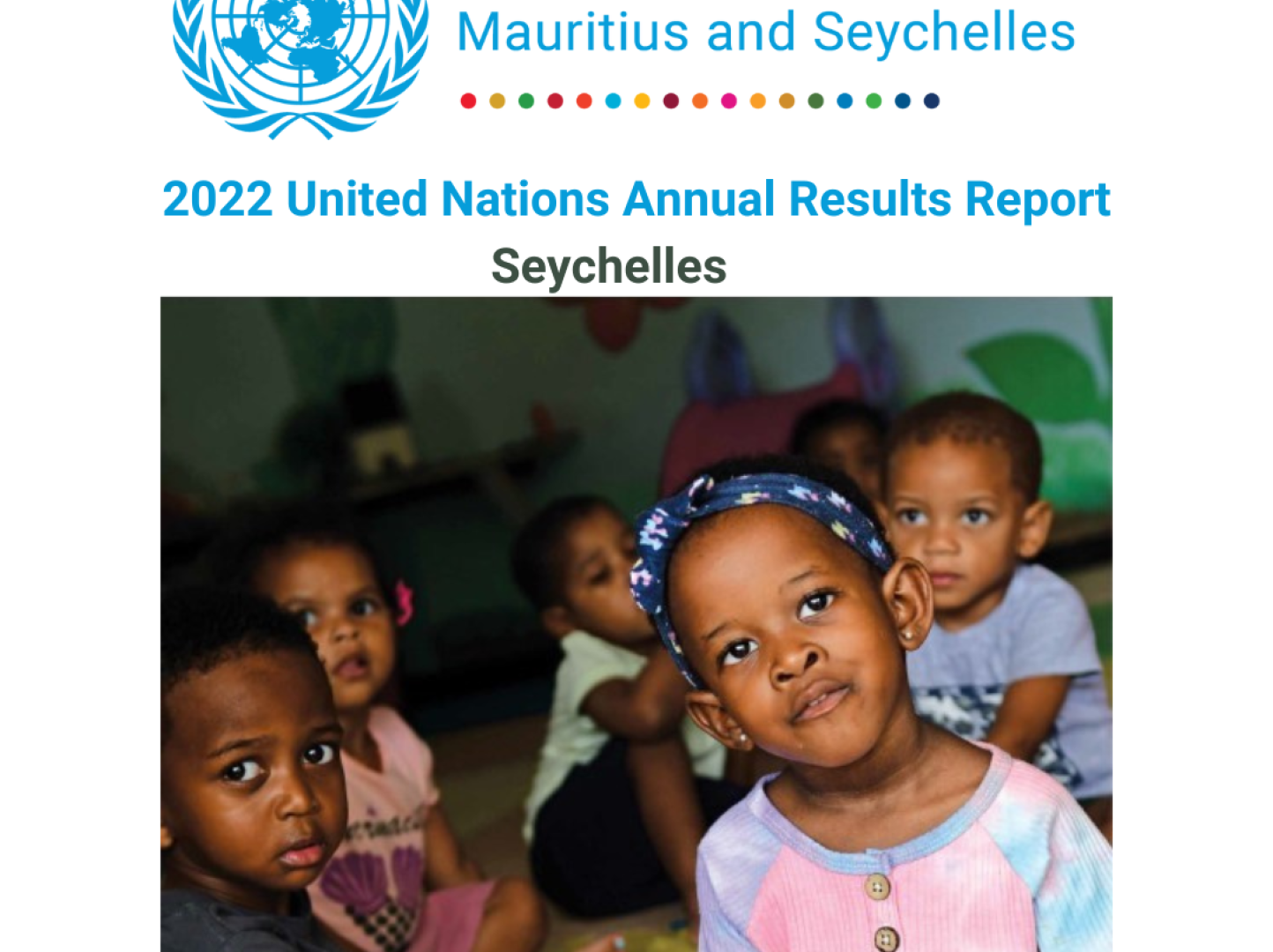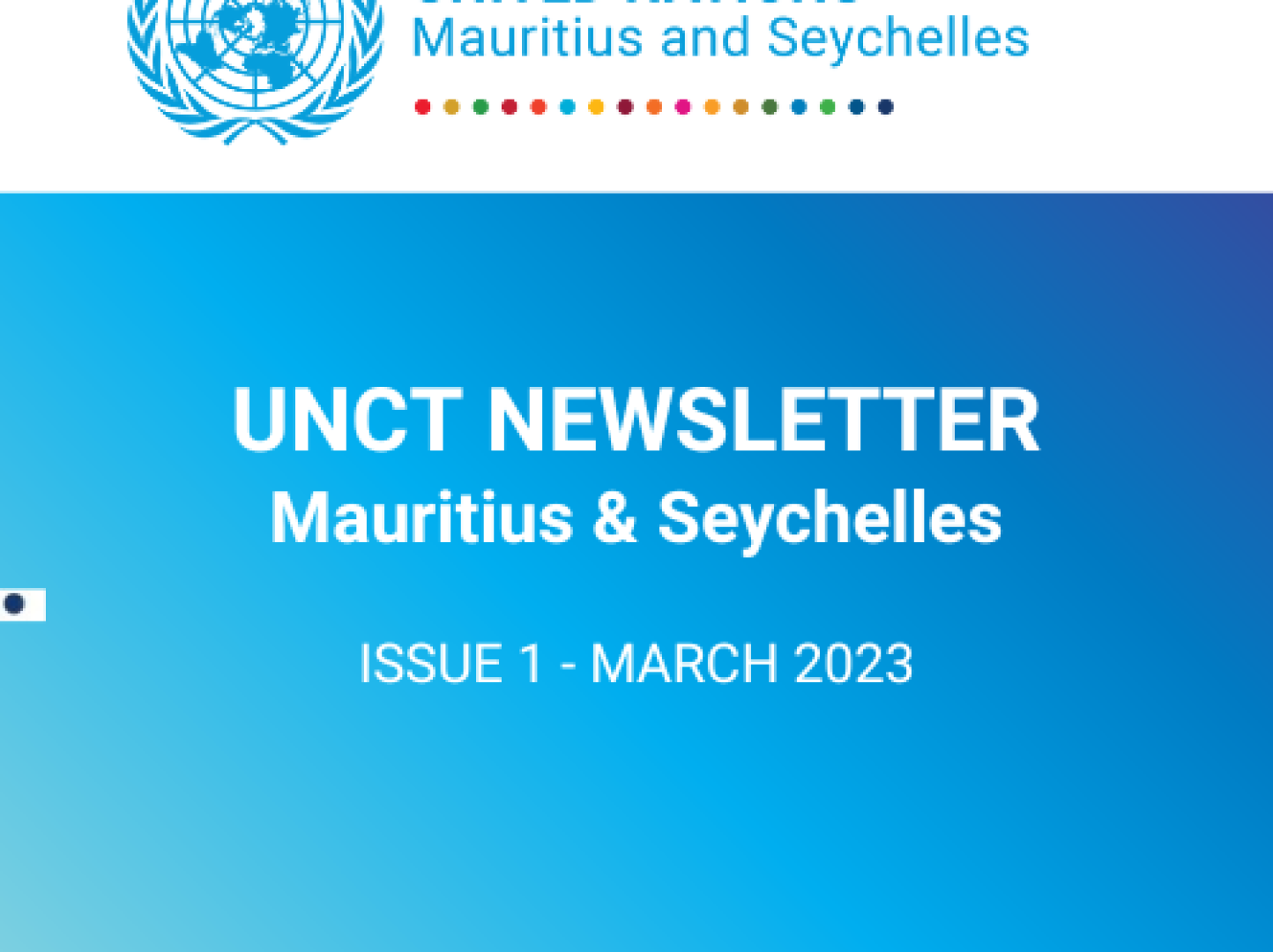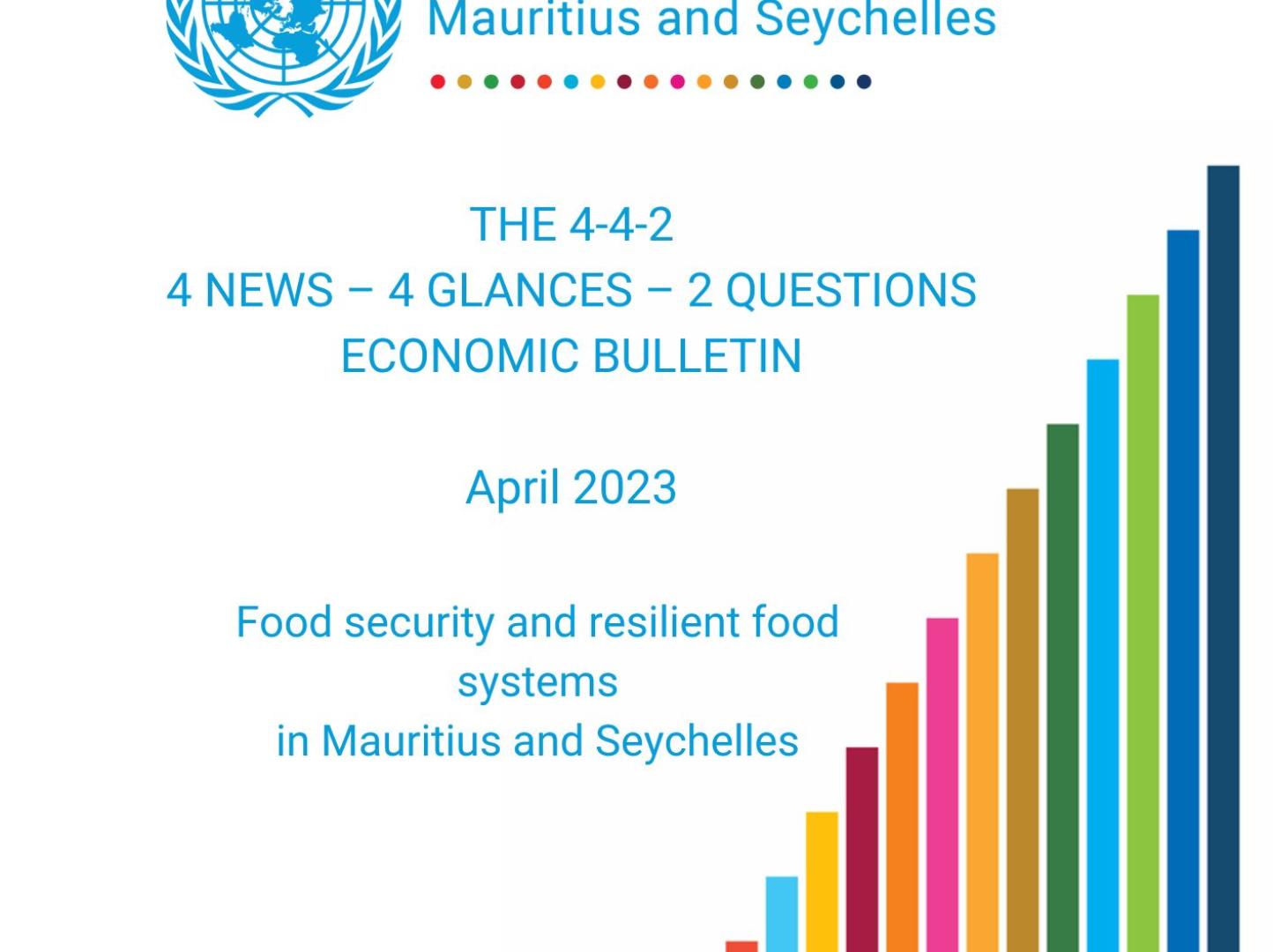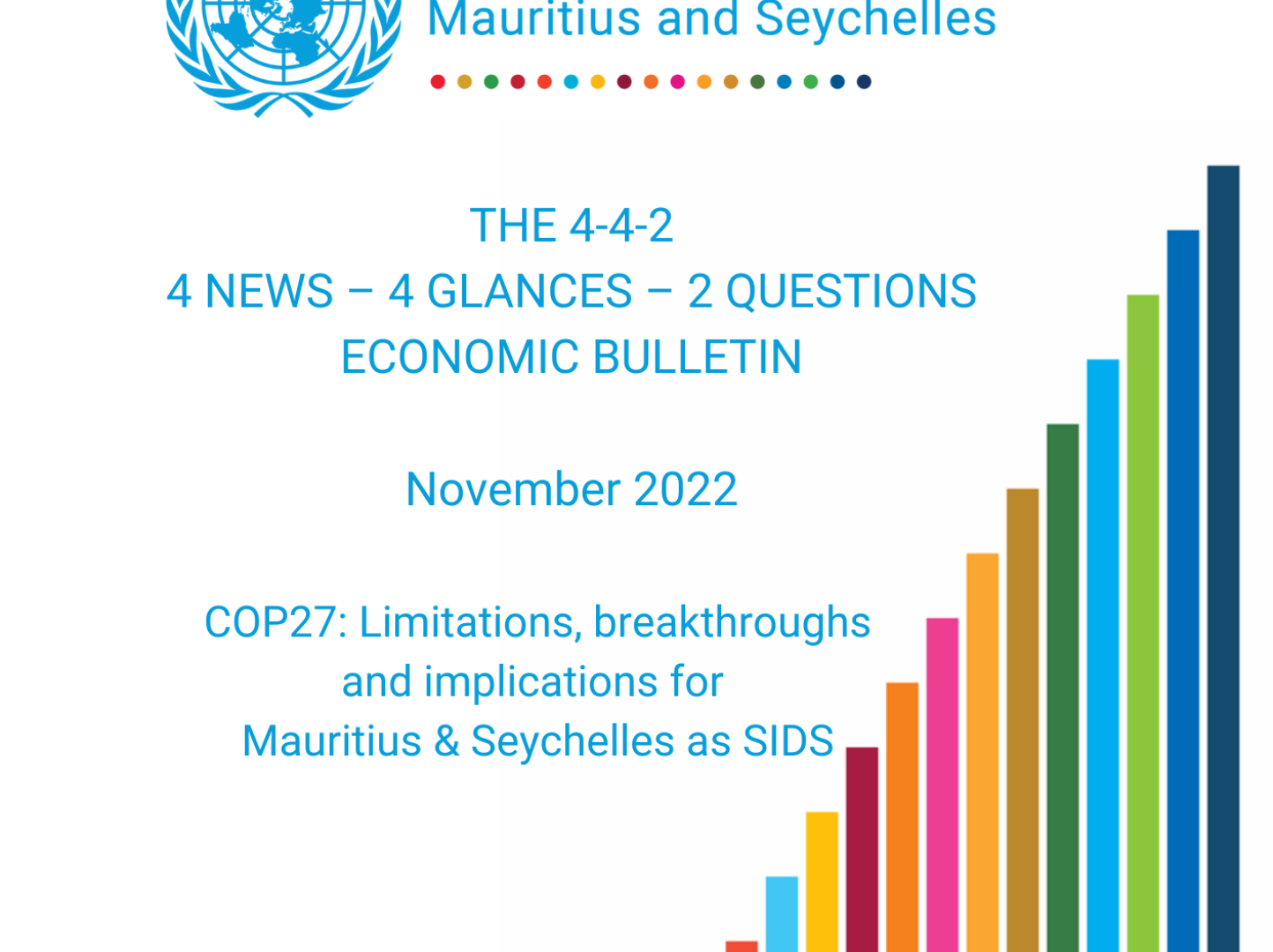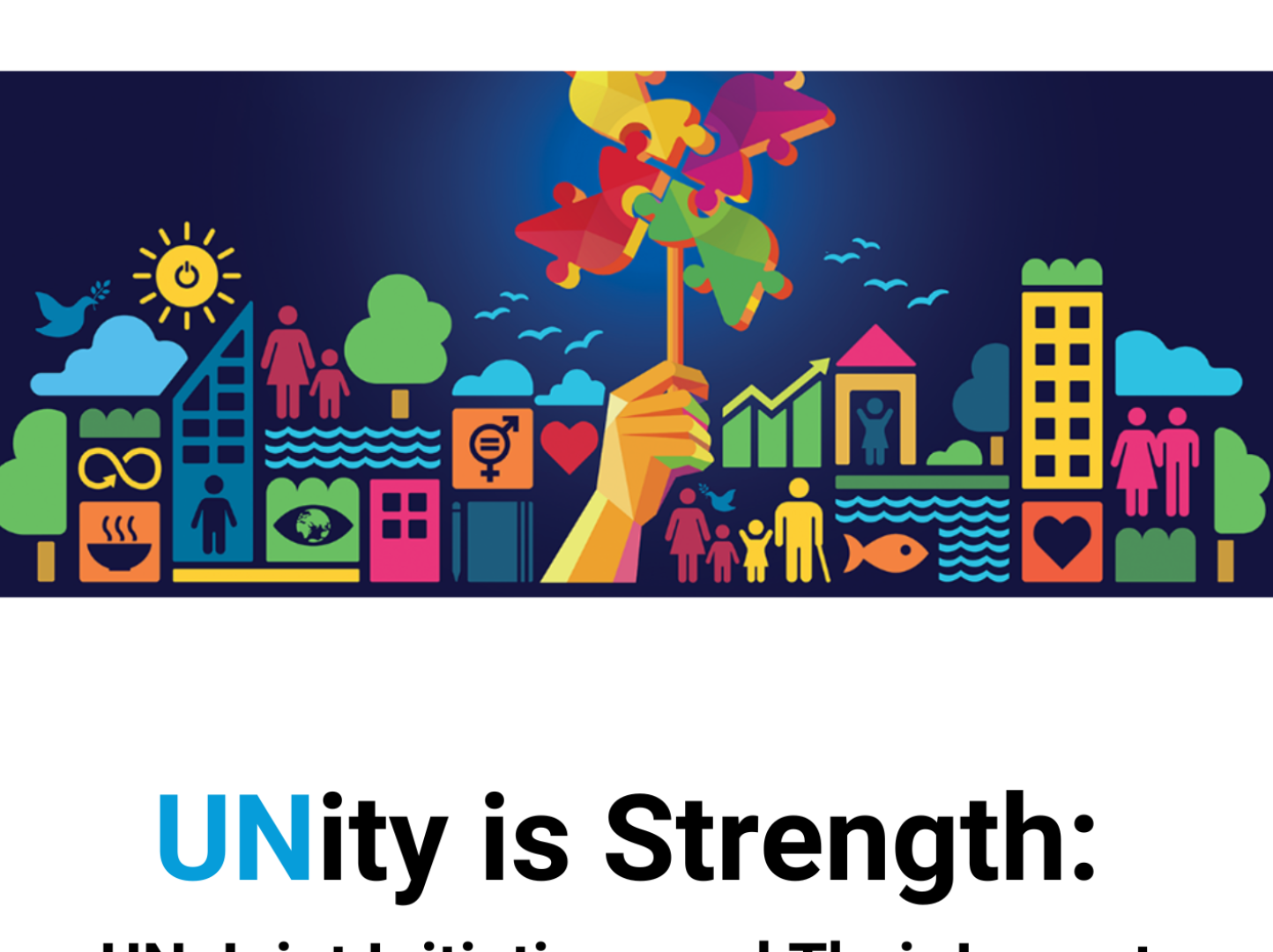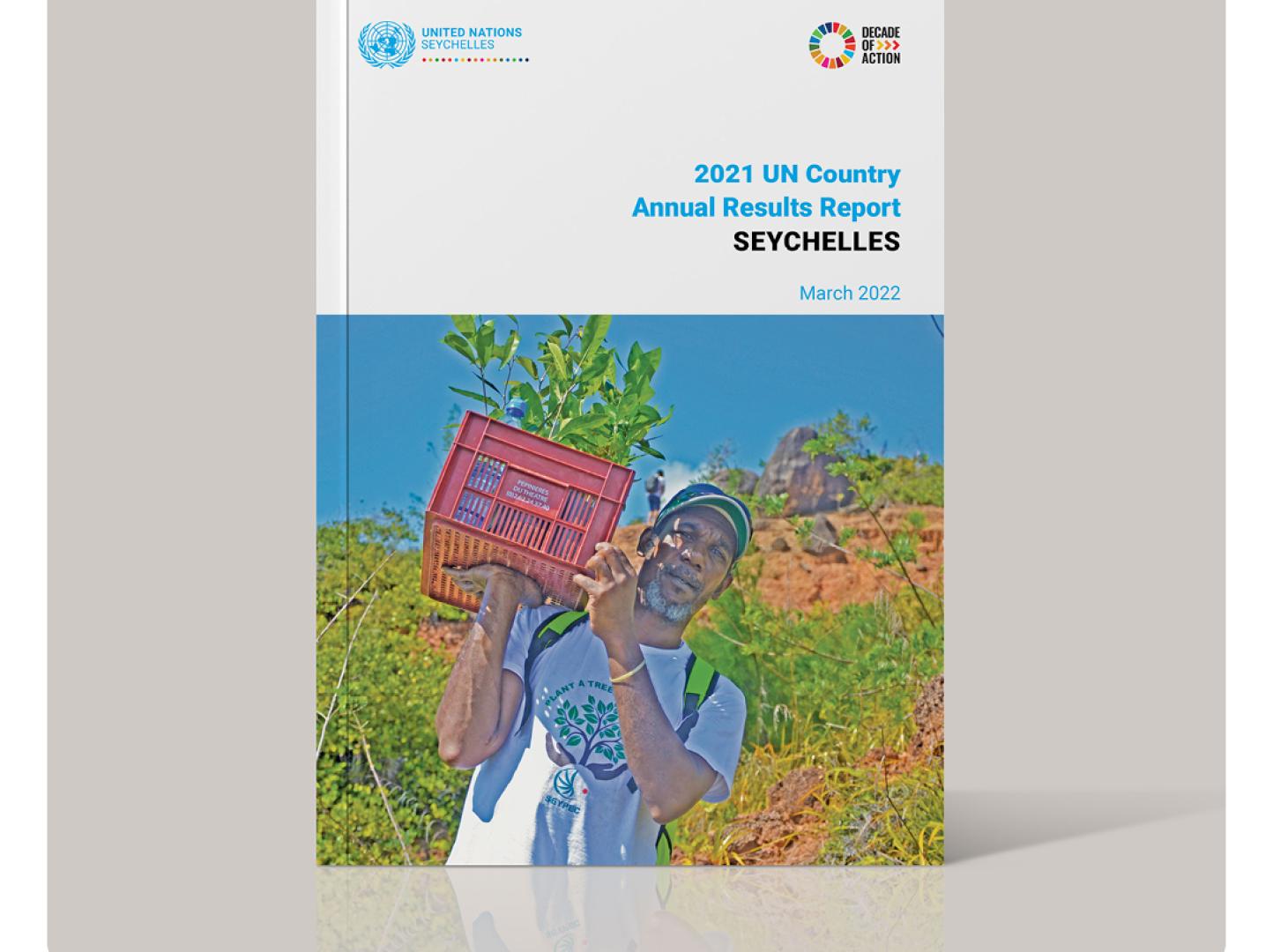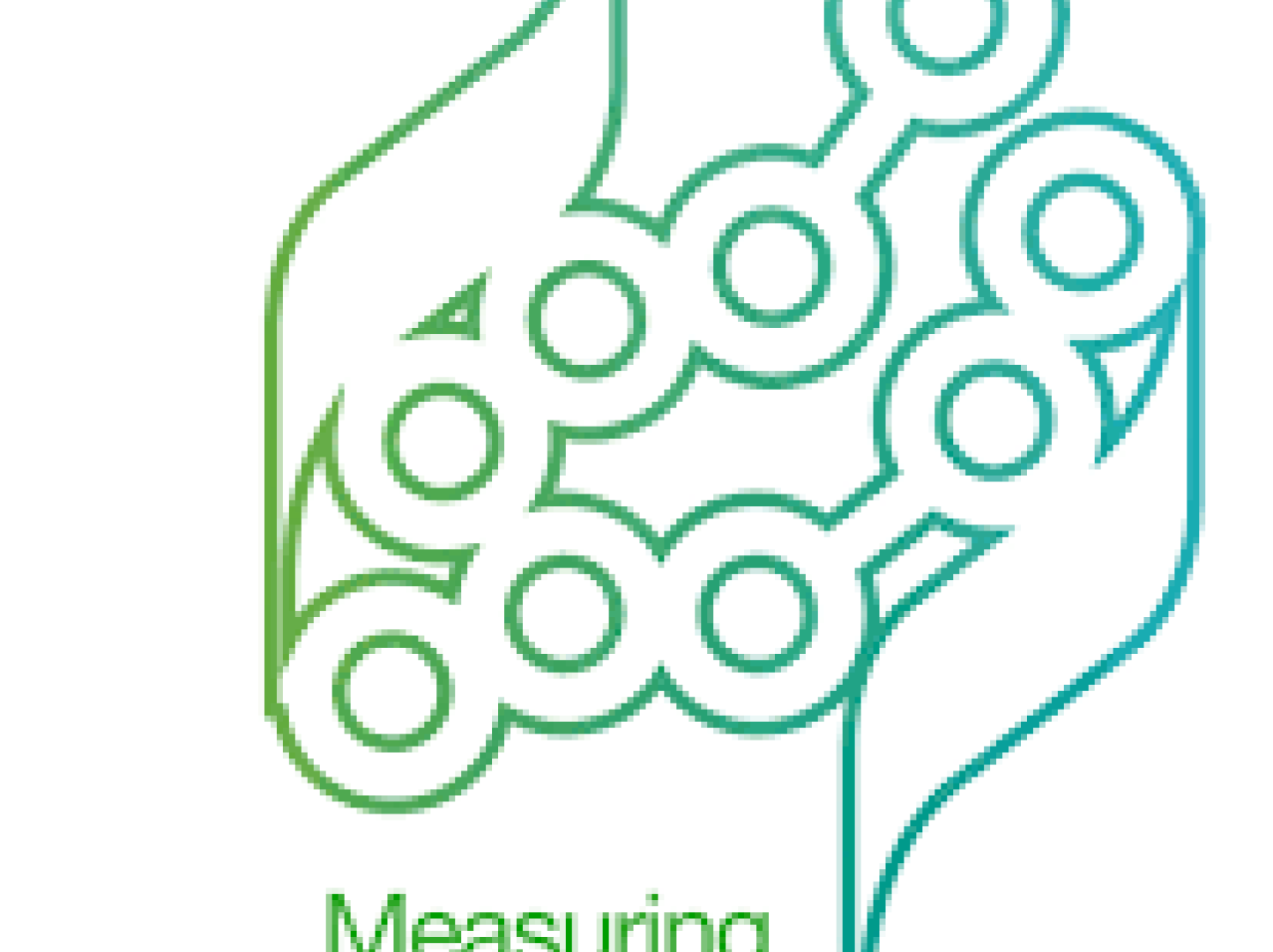Latest
Story
10 April 2024
Advancing Ethical Recruitment and Skills Mobility in the Indian Ocean Region
Learn more
Story
08 April 2024
Delivering Stronger, UNited for People, Prosperity and Planet
Learn more
Press Release
03 April 2024
Delivering Stronger, UNited for People, Prosperity and Planet
Learn more
Latest
The Sustainable Development Goals in Seychelles
The Sustainable Development Goals are a global call to action to end poverty, protect the earth’s environment and climate, and ensure that people everywhere can enjoy peace and prosperity. These are the goals the UN is working on in the United Nations Resident Coordinator's office for Seychelles:
Story
25 January 2024
Taking Action for a “clean” information ecosystem
Information pollution is a feature of our communication exchanges today. Ranging from spam messages cluttering up your inbox or unwanted advertising popping up on your social media pages to information being weaponized to incite violence, threaten democracy and human rights, and undermine public health and climate action. In his “Common Agenda” report the United Nations Secretary-General has identified the spread of mis- and disinformation and hate speech as an “existential risk to humanity” affecting all the Sustainable Development Goals.
Globally an estimated 67 percent of the world’s population is online as per the recent ITU Facts and Figures report. The figure for Mauritius is 68 per cent of people while in Seychelles is higher with 82 per cent. The vast scope for communications provided by digital platforms has brought about many incredible benefits to our society, increasing access to information, creating real-time engagement, and amplifying voices. But it is also evident that the sheer volume and questionable quality of information at our fingertips presents challenges of its own. This makes finding a solution to address the contamination of the information ecosystem no easy task.
Our UN Country Teams in Mauritius and Seychelles are taking action for information integrity to support a “clean” information ecosystem where human rights and freedom of expression can thrive. Here are some ways we are doing this:
Advancing internet integrity through national consultations for a voluntary UN Code of Conduct for Information Integrity on Digital Platforms bringing together stakeholders from human rights to tech entrepreneurs to share their recommendations on the 9 principles for the Secretary-General led voluntary Code of Conduct to be presented to member states at the Summit of the Future.
Empowering the youth internet users through the Noontime Knowledge Series led in collaboration with university students. The focus of the most recent series was privacy concerns around AI and its impact on youth rights.
Facilitating the visit of the Special Rapporteur on the right to privacy to Mauritius who examined privacy issues in relation to personal data, sharing of data across borders and cybersecurity, surveillance, artificial intelligence, gender, vulnerable persons, and children in the digital age.
The world is at a critical tipping point for digital governance. As we work to advance the 17 sustainable development goals it is vital that the international community prioritizes a digital space that's more transparent, inclusive and safe for all.
*************************************************************************************
For more information:
UN Code of Conduct 9 Principles
ITU Facts and Figures Report 2023
Noontime Knowledge Series
Special Rapporteur on the right to privacy
1 of 5
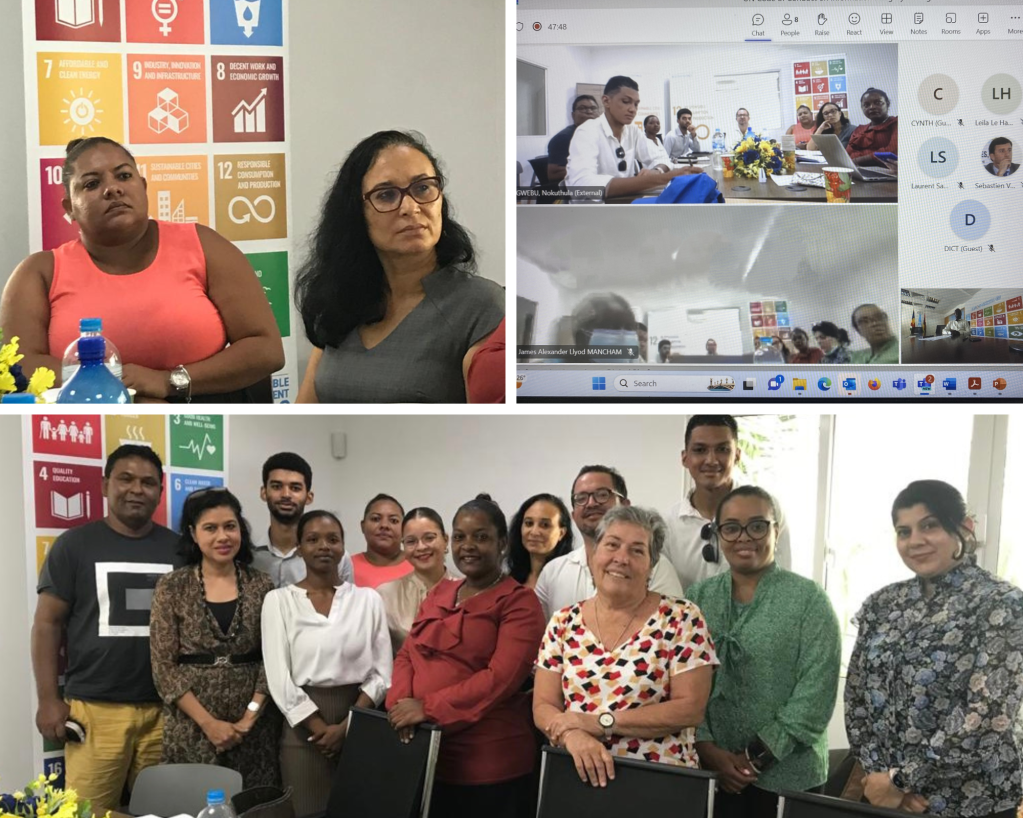
Video
20 February 2024
WHO increases funding for new Joint Work Plan with the Government of Seychelles
On 19 February the Minister of Health for Seychelles Ms. Peggy Vidot and WHO Representative Dr. Rex Mpazanje signed a two-year joint work plan for 2024-2025 to support universal health coverage and improve preparedness to address public health emergencies. WHO has increased its funding to Seychelles by one million US dollars bringing the total commitment to almost 3 million US dollars.
1 of 5
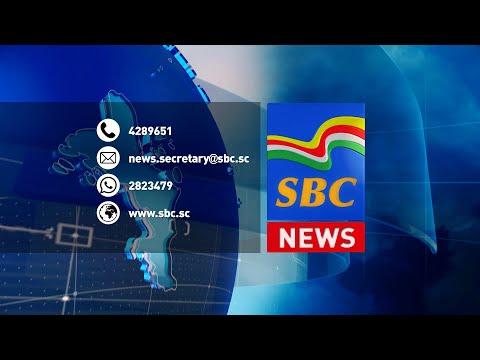
Video
24 January 2024
UNODC enhancing regional maritime security and law enforcement capacity
From 18-31 October at the advanced regional training centre in Seychelles the United Nations Office on Drugs and Crime (UNODC) Global Maritime Crime Programme (GMCP) traveling team of experts facilitated two maritime rule of law exercises - MROLEX. The training looked at maritime security operations, ranging from vessel detection capabilities, legally-sound boarding procedures, the maintenance of maritime assets, and prosecution of maritime crime.
The thirty-two participants from Mauritius, Seychelles and Somalia who attended represented personnel from maritime law enforcement (coast guard, marines, police, customs), maritime maintenance (engineers from coast guard or police), prosecutors (either from ODPP for example or judiciary), and maritime domain awareness (watch standers who form part of national coast guard or police).
Find out more:
Supporting the health of island nations with maritime law enforcement | United Nations in Seychelles
1 of 5

Story
08 April 2024
Women Empowering Women in Seychelles
UNFPA in Seychelles, in collaboration with the Ministry of Youth, Sports and Family, hosted a High-Level Forum celebrating International Women’s Day 2024 on 14th March in Mahe. The Forum aimed to explore ways to invest in women, as per the IWD 2024 theme, and placed entrepreneurship as a vehicle for transformational change to address sustainable development issues. The High-level Forum saw the participation of the First Lady of the Republic of Seychelles and of female Ministers in the Seychelles. It was an opportunity to celebrate the women and girls who are championing the advancement of entrepreneurship and to promote women's access to various financing opportunities including start-up and growth of Small and Medium Enterprises. UNFPA brought in the specific perspective of investing in women’s health to ensure sustainable growth.Throughout the day, different panels and roundtables were organized with honorary and guest speakers to comprehensively discuss the challenges and opportunities for women’s empowerment and wellbeing in Seychelles. Mrs. Marie-Celine Zialor, Minister of Youth, Sports and Family gave a strong opening speech in which she brought up the importance of self-care, and the need for women to unapologetically invest in themselves. “Let us be bold, audacious, unapologetic. We wait for so long for someone else to celebrate us, let us celebrate ourselves.” Devika Vidot, Minister of Investment, Entrepreneurship and Investment called for women to come together to advance progress and development in Seychelles.“We live and survive hardships (...) Be bold, be different, make a priority to stand up for yourselves.” Ms. Lisa Singh, United Nations Resident Coordinator for Mauritius and Seychelles highlighted:"One crucial aspect of UN efforts is investing in women. By collaborating and supporting each other, we can amplify the impact of our investments and create opportunities that transform the lives of women and girls."UNFPA Regional Director for East and Southern Africa, Lydia Zigomo, congratulated Seychelles on achieving gender parity in education in Seychelles, as well as their impressive progress in reaching almost 0 in 2 of the 3 UNFPA’s transformative results. Despite these strongly positive numbers, Regional Director Zigomo highlighted that gender inequalities and harmful gender norms still significantly contribute to the inability of women and girls to claim their right to bodily autonomy in Seychelles and encouraged the country to continue its efforts to address the structural barriers which threaten the health, safety, dignity and life aspirations of adolescent girls and young women. “Ladies and Gentlemen, we have unfinished business, and we must work together with urgency, investing in women and seizing every opportunity to achieve the inclusive, equitable and sustainable vision of the ICPD.” It was a most inspiring forum, with testimonies from remarkable women in Seychelles, who in spite of challenges and obstacles, pushed on and in their own way, made their success.
1 of 5
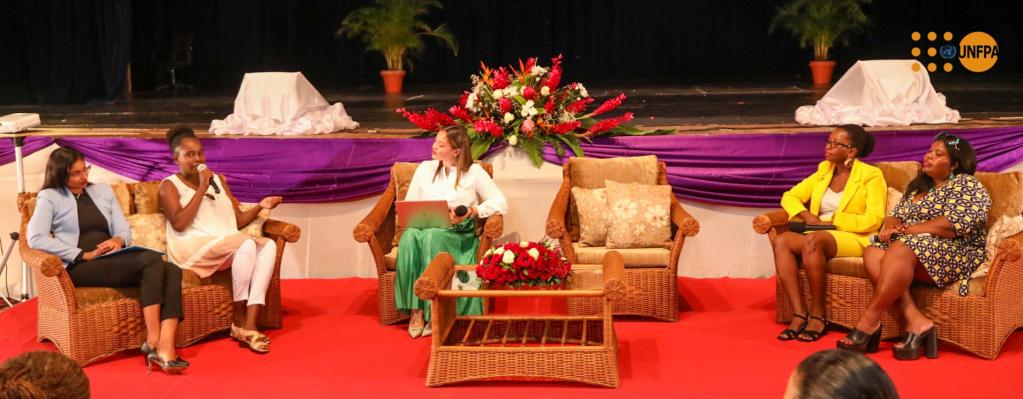
Story
10 April 2024
Advancing Ethical Recruitment and Skills Mobility in the Indian Ocean Region
Traditionally, in the Indian Ocean labour migration goverance has been viewed as the exclusive responsibility of member states. Private Sector's Call for Concrete SolutionsHowever, the dynamics are evolving with employers' representatives advocating for practical, real-time solutions to address pressing issues, ranging from labour shortages across skill levels to the mismatch in skills and the transfer of skills. They emphasize the importance of rapid identification of labour market needs through comprehensive labour migration statistics. Moreover, employers demand evidence-based, transparent, and efficient labour migration policies at the national level. This includes accelerating and simplifying work and residence permit processes and refining systems for the recognition of qualifications.Southern Africa Migration Management Project's (SAMM) Initiatives**The SAMM project has been at the forefront of fostering dialogue and collaboration between employers and policymakers. In 2022, SAMM organized two significant workshops focusing on labour migration governance in the Southern African Development Community (SADC) and the Indian Ocean region. These workshops aimed to raise awareness among employers and gather their perspectives on labour migration governance.The first workshop, held in Johannesburg in partnership with the International Organisation of Employers (IOE), addressed business perspectives on labour migration governance in Southern Africa. The second workshop, in collaboration with IOE Policy Working Group on Migration, delved into the dialogue between employers and policymakers in the Indian Ocean region, specifically involving representatives from Comoros, Madagascar, Mauritius, and Seychelles.Challenges and RecommendationsDuring the workshops organized during the first week of October 2023, employers as well as the Government and Workers’ representatives highlighted challenges related to climate change, youth unemployment, and labour shortages in key sectors like construction, tourism, agriculture, fisheries, and ICT of the Indian Ocean region. Additionally, they pointed out the difficulties in aligning education with the job market and the reluctance of the national workforce to engage in low-skilled, low-paid jobs.The SAMM project's core initiative includes developing a Code of Conduct on the Fair and Ethical Recruitment of Migrant Workers in the Indian Ocean region and its self-assessment tool, which were endorsed by the participants. This Code, discussed during the workshops, emphasizes transparency, accountability, and proactivity in labour migration practices.Key Recommendations and Framework DevelopmentThe initial recommendations from the employers and Private sector include the creation of a Fair and Ethical Recruitment Code of Conduct, support for a Regional Free Movement of Persons Agreement, development of regional labour market information systems, and enhanced social dialogue involving social partners in skills recognition mechanisms. Hence, the SAMM project has been actively involved through the first and second workshops in October 2023 to presenting a Fair and Ethical Recruitment Code of Conduct as well as its Self-Assessment tool for the Indian Ocean region. Moreover, skills mobility frameworks were developed at national and regional level, emphasizing the importance of social dialogue, capacity-building, and strengthening labour migration governance in the region. The framework also explores bilateral labour migration agreements and temporary migration programs to address immediate skills gaps and promote skills transfer. Both regional documents were endorsed at country and regional level with a few minor edits.ConclusionThe evolving landscape of labour migration governance in the Indian Ocean region reflects a collaborative effort between the private sector, policymakers, and international organizations. By prioritizing ethical recruitment, skills mobility, and fostering regional cooperation, the region aims to create a fair and sustainable labour migration framework that benefits both countries of origin and destination, employers, recruiting agencies, and migrant workers alike. Through ongoing initiatives under SAMM, the Indian Ocean region is paving the way for responsible and inclusive labour migration practices.Find out more here.**************************************************************************The SAMM Project is implemented by the ILO in collaboration with the International Organisation for Migration (IOM), the United Nations Office on Drugs and Crime (UNODC) and the United Nations High Commissioner for Refugees (UNHCR).
1 of 5
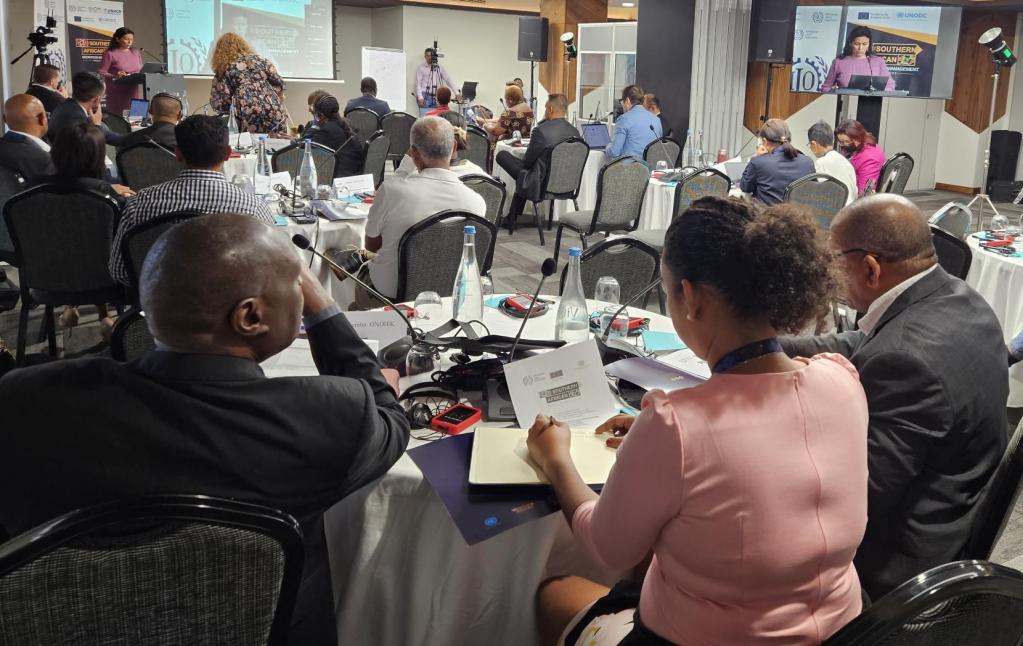
Story
08 April 2024
Delivering Stronger, UNited for People, Prosperity and Planet
The United Nations Country Team (UNCT) for Mauritius and Seychelles held their Annual Retreat entitled “Delivering Stronger, UNited for People, Prosperity and Planet” from the 3rd to the 5th of April of 2024 in Mauritius. It brought together UN agencies and their partners – Government, private sector and civil society - to strengthen cooperation and identify opportunities for new collaboration. During the Opening Ceremony at Maritim Hotel, Balaclava Ms Lisa Singh, UN Resident Coordinator for Mauritius and Seychelles highlighted this as a pivotal moment for the UNCT marking the first cycle of implementation of the new Cooperation Frameworks for sustainable development signed last year with the governments of each country.“Given the uniqueness of SIDS, many UN agencies have developed and are developing their SIDS strategy to better address their higher-than-average vulnerabilities to exogenous shocks. We also need to go beyond the small states narrative, for SIDS are more than small islands but large ocean states.”Joining remotely the Hon. Sylvestre Radegonde Minister of Foreign Affairs and Tourism of Seychelles underlined:“Through strategic planning and evidence-based approaches…we have the opportunity to affect change for every Seychellois and Mauritian. The loss and damage fund, the multi-dimensional vulnerability index and the outcomes of the forthcoming SIDS4 Conference are tangible steps that will supercharge the breakthroughs needed by us to achieve the shared vision of Agenda 2030 of leaving no one behind. By analysing our challenges and successes we pave the way for the strategic implementation of this Cooperation Framework.”In his opening remarks the Hon. Maneesh Gobin Minister of Foreign Affairs, Regional Integration and International Trade of Mauritius and Government of Seychelles emphasized:“Small Island Nations like Mauritius have unique inherent vulnerabilities which are often overlooked when it comes to resource mobilisation for development. We need to go beyond the GDP per Capita criteria and rapidly devise a vulnerability index tailored specifically for SIDS which will enable small islands to mobilise the adequate resources needed to address the urgent development challenges and the existential threats posed by climate change. This should be a priority at the forthcoming SIDS4 Conference in Antigua and Barbuda.”Panel discussions held during the Retreat comprised representation from across sectors to focus conversation on key headlight issues for each pillar of the Cooperation Framework (People, Prosperity, and Planet). They provided a platform for strategic dialogue to enhance collaboration across the UNCT and to collectively identify the pathways through which the UN will make a difference in the implementation of its Cooperation Frameworks. It was recognised that although both countries are experiencing outstanding sustainable development journeys, persisting challenges and vulnerabilities demand a proactively People-centred approach to ensure that UN interventions have a real positive impact on the lives and livelihood of people in Mauritius and Seychelles. Over the three days the participants looked at how joint action can drive change in the six transition areas positioning the UN as: a strategic adviser, a pivotal partnership broker, and a provider of high-level expertise to install capacities, boost public and private investments in sustainable development priorities, and ultimately to build resilience and advance SDG transformation.The Fourth International Conference on SIDS next month will be an opportunity to boost these ongoing efforts by fostering South-South and SIDS-to-SIDS cooperation, and joint action between Mauritius and Seychelles.
1 of 5
Story
06 February 2024
Turbocharging UNCT Collaboration with a Digital Knowledge Sharing Platform
Background
The only multi-country SIDS office in Africa, the Mauritius and Seychelles United Nations Country Team (UNCT) comprises over 80 percent of UN agencies which are non-resident spread across continents, time zones, and operational contexts. Therefore, ensuring consistent and effective communication and collaboration becomes even more pivotal particularly as the two countries gear up to launch the implementation of the new UN Cooperation frameworks 2024-2028. Recognizing this imperative, the Resident Coordinator's Office (RCO) in Mauritius & Seychelles (MCO) successfully created and rolled out the UN Mauritius & Seychelles Knowledge Sharing Platform on SharePoint.
Six months after its official launch by our Resident Coordinator, Ms. Lisa Singh, the Platform today has more than 150 UN officers covering Mauritius and Seychelles from across the globe, as a mechanism for a robust interagency collaboration.
Key features:
Document Collaboration and Sharing: Ensuring Consistency and Efficiency
Be it for Common Country Analysis (CCA), Cooperation Framework, UNCT Results Reports, Universal Periodic Review, document sharing, review, and approval form a substantial chunk of our collaborative efforts. For us, 2023 was a busy year with the evaluation of the previous Cooperation Frameworks, followed by the design of the new Cooperation Frameworks, and CCA updates. These key steps required multiple rounds of input and feedback from the interagency working groups PMT, OMT, and UNCT - multiply by 2! The Platform made this process much easier by allowing UNCT colleagues to access, comment, and edit shared documents stored at a single, centralized, and secure platform. We witness a large decrease in back-and-forth of documents, and reduced oversight of vital inputs. The time required for document review and approval processes has been considerably reduced as well.
Thematic Document Repository: Shared knowledge on a shared platform
We made sure everyone in our UNCT, regardless of their location, could access needed resources through an easily accessible Thematic Document Repository as part of the Platform, which categorizes relevant documents per specific themes, such as environment, human rights, and health. This was useful, particularly for our work on the CCA and its timely update. It houses all historical and recent data and reports, ensuring that UNCT can easily track developments, identify trends, and collectively recognize challenges and opportunities. The RCOteam and I receive the new files, quality assure, and upload them to the Platform in a structured manner. We are planning to further enhance the repository by introducing carefully crafted metadata so colleagues can access relevant resources across thematic areas more easily, which, we hope will increase opportunities for more integrated policy work across thematic areas.
Interagency Working Groups: Promoting Focused Collaborations
We introduced dedicated spaces for interagency working groups such as the Results Groups, PMT, OMT, MEL, Communications, PSEA and on Gender. These serve as hubs for focused discussions, streamlined document sharing, and efficient project management. We have seen a huge increase in agency engagement as well as speedy and consistent communications within working groups through these dedicated spaces.
A Consolidated Contact List: Bridging Communication Gaps
Our Platform also houses a comprehensive and unified contact list accessible to everyone in the UNCT to help colleagues identify and connect with appropriate individuals or teams, ensuring that there are no missed connections. As the lead of this Platform, I mainly manage this list, but anyone in the UNCT has editing access and is asked to keep it updated during meetings. Part of the information on the list also helps us keep UNINFO UNCT composition up to date.
Elevating Collective Expertise: E-Courses and Webinar Repositories on the UNCT SharePoint Site
We realized that the different UN learning platforms contain a wealth of knowledge which staff are not always aware of. To address this, we dedicated a page to e-Courses from different UN entities fostering an environment of lifelong learning and self-paced upskilling.
Other features of the Platform include the News, and webinar archives to keep our UNCT members abreast with the new guidance and each other’s initiatives and facilitate access to the learning resources related to the work of the UNCT. What we learnt: Plan First: Before diving into SharePoint, outline the specific needs and desired outcomes of your UNCT, and understand your users. This helps the site serve its intended purpose. Through consultation with our UNCTs, we understood that the demand for an internal “knowledge one-stop shop” is high, and they expect the RCO to bridge this gap. Keep it simple: While SharePoint offers robust customization, over-customization can make maintenance cumbersome. Determine early on what truly needs custom solutions and what can be managed with out-of-the-box features to save time. Leadership matters: Undeniably, leadership buy-in is paramount when establishing a Knowledge Sharing Platform. The commitment and endorsement of UNCT senior leaders serve as a driving force behind the successful implementation and adoption of this collaborative platform. In our case, the RC has been a strong advocate for the Platform, and our Head of Office played a crucial role in bringing UN entities on board. Content is King: A Platform may be technically perfect, but if the content isn't relevant, regularly updated, or properly organized, it loses its true value. A content strategy, coupled with regular quality assurance, keeps a collaboration platform valuable. Training is Essential: Users need to know how to navigate the Platform. We developed a “Step-by-step” guide, tailored video tutorials and offer on-demand hands-on training. Introducing or overhauling a Platform often requires a significant behavioural change in users. Proactively manage this change by communicating the benefits, offering support, and being receptive to feedback. Feedback is Gold: Create feedback loops, where users can report issues or suggest improvements to ensure the platform remains relevant. Test Thoroughly: Testing the Platform prior to the launch to detect bugs, performance issues, or user experience problems can save countless headaches down the line. Our testing phase with PMT members enabled us to quickly amend a few access issues before the launch. Conclusion The introduction of the UNCT Knowledge Sharing Platform is a reflection of our pursuit of excellence and efficiency in interagency operations. When equipped with the right tools and platforms, the collective strength and synergy of our diverse agencies can be optimized to further the overarching goals and missions of the UN. While the initial investment to set up the Platform is considerable, the gain in efficiency and effectiveness is totally worth it!
Other features of the Platform include the News, and webinar archives to keep our UNCT members abreast with the new guidance and each other’s initiatives and facilitate access to the learning resources related to the work of the UNCT. What we learnt: Plan First: Before diving into SharePoint, outline the specific needs and desired outcomes of your UNCT, and understand your users. This helps the site serve its intended purpose. Through consultation with our UNCTs, we understood that the demand for an internal “knowledge one-stop shop” is high, and they expect the RCO to bridge this gap. Keep it simple: While SharePoint offers robust customization, over-customization can make maintenance cumbersome. Determine early on what truly needs custom solutions and what can be managed with out-of-the-box features to save time. Leadership matters: Undeniably, leadership buy-in is paramount when establishing a Knowledge Sharing Platform. The commitment and endorsement of UNCT senior leaders serve as a driving force behind the successful implementation and adoption of this collaborative platform. In our case, the RC has been a strong advocate for the Platform, and our Head of Office played a crucial role in bringing UN entities on board. Content is King: A Platform may be technically perfect, but if the content isn't relevant, regularly updated, or properly organized, it loses its true value. A content strategy, coupled with regular quality assurance, keeps a collaboration platform valuable. Training is Essential: Users need to know how to navigate the Platform. We developed a “Step-by-step” guide, tailored video tutorials and offer on-demand hands-on training. Introducing or overhauling a Platform often requires a significant behavioural change in users. Proactively manage this change by communicating the benefits, offering support, and being receptive to feedback. Feedback is Gold: Create feedback loops, where users can report issues or suggest improvements to ensure the platform remains relevant. Test Thoroughly: Testing the Platform prior to the launch to detect bugs, performance issues, or user experience problems can save countless headaches down the line. Our testing phase with PMT members enabled us to quickly amend a few access issues before the launch. Conclusion The introduction of the UNCT Knowledge Sharing Platform is a reflection of our pursuit of excellence and efficiency in interagency operations. When equipped with the right tools and platforms, the collective strength and synergy of our diverse agencies can be optimized to further the overarching goals and missions of the UN. While the initial investment to set up the Platform is considerable, the gain in efficiency and effectiveness is totally worth it!
1 of 5
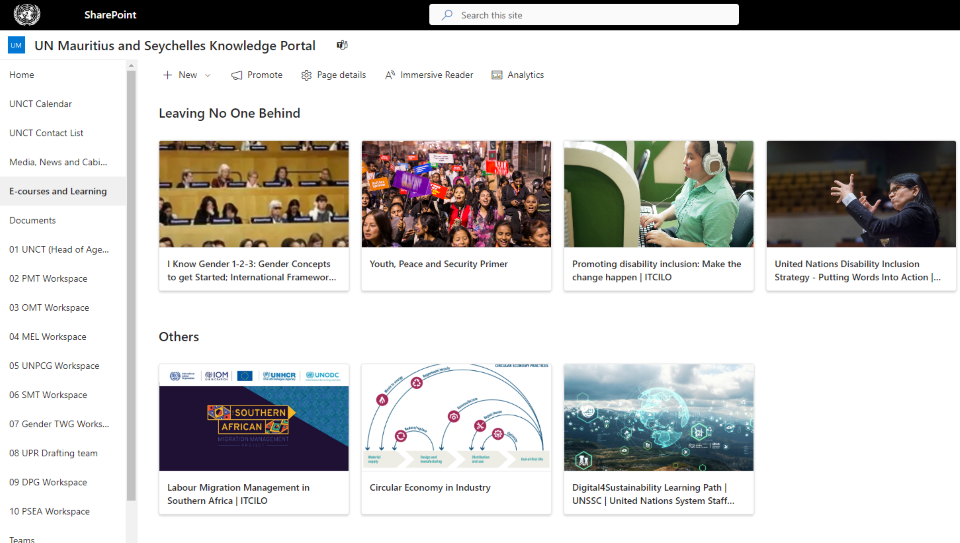
Story
13 December 2023
Promoting Health and Safety at Work
The Ministry of Employment and Social Affairs of Seychelles in collaboration with the International Labour Organisation (ILO) held a two-day occupational safety and health workshop for safety officers from different industries including tourism and construction from November 13 to 14 2023.
Introducing the workshop, Ms. Peneyambeko Munkawa, ILO’s occupational safety and health specialist, stressed that the ILO had identified ‘work safety and health’ as one of the people’s fundamental principles and rights at work.
Four main topics, namely risk assessment, accident investigation, workplace policy and occupational safety and health and lastly implementation of occupational safety and health management systems were discussed by the participants.
Mrs. Hillary Albert, the Sustainability Coordinator at Constance Ephelia resort, confirmed the importance of the workshop because it was really helpful and informative as it identified the different safety hazards in a workplace and how to go about reducing and eliminating risks.
Let’s be part of the change!
1 of 5
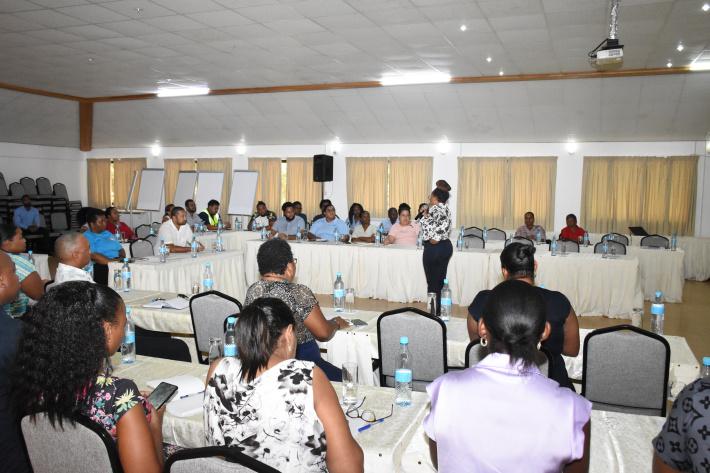
Story
27 November 2023
Supporting the health of island nations with maritime law enforcement
The ocean brings huge opportunities for island states like Mauritius and Seychelles with the Western Indian Ocean as one of the main maritime routes in the world. Legitimate global trade depends on this route, but the vastness of the ocean creates opportunities for maritime crime including piracy, trafficking of drugs, arms, people, and prohibited goods, smuggling and illicit fishing.
According to the Mauritian Ministry of Ocean Economy, Marine Resources, Fisheries, Shipping and Outer Islands, the persistent scourge of piracy off the coasts of Somalia threatens the security of private sector development, regional and international trade, economic integration, and development. While the influx of drugs, smuggling of goods, and human trafficking increase crime within society. Together with the unacceptable human cost – crime takes its toll on the ability of the country to meet its development priorities including the Sustainable Development Goals (SDGs).
From 18-31 October at the advanced regional training centre in Seychelles the United Nations Office on Drugs and Crime (UNODC) Global Maritime Crime Programme (GMCP) traveling team of experts facilitated two maritime rule of law exercises - MROLEX. The training looked at maritime security operations, ranging from vessel detection capabilities, legally-sound boarding procedures, the maintenance of maritime assets, and prosecution of maritime crime.
The thirty-two participants from Mauritius, Seychelles and Somalia who attended represented personnel from maritime law enforcement (coast guard, marines, police, customs), maritime maintenance (engineers from coast guard or police), prosecutors (either from ODPP for example or judiciary), and maritime domain awareness (watch standers who form part of national coast guard or police). South-South knowledge sharing is embedded in the training as the various country teams meeting in Seychelles were given the opportunity to learn from one another and establish contacts with fellow law enforcement personnel from neighbouring countries. Such professional networks form the basis for the joint effort to tackle common threats and challenges on regional and international levels.
In her closing remarks at the MROLEX I training, Ms. Lisa Singh, the United Nations Resident Coordinator for Mauritius and Seychelles thanked the Seychelles Ministry of Internal Affairs, Seychelles Defence Forces, and Seychelles Police Force for their collaboration emphasizing that strengthening good governance, particularly as it relates to the rule of law is a shared responsibility that we must all embrace.
Highlighting the necessity to be ready to address these issues nationally and as a region at the 3rd Ministerial Conference on Maritime Safety and Security in the Western Indian Ocean held in November in Mauritius a key aim was to confirm and amplify commitments by the members states to combat risks and crimes at sea. As part of the Final Declaration: “The Conference recognises that the Ministerial Conferences’ outcomes require a regionally led, coordinated and complementary maritime security and safety mechanism as a deterrence against transboundary illicit and criminal activities at sea.” The United Nations remains committed to working in partnership to keep our oceans and people safe. This assurance is demonstrated by the presence of maritime issues in all three of the focus areas broadly encompassing People, Prosperity and Planet of the two new Cooperation Framework’s for 2024 – 2028 co-signed by the UN and host governments in Mauritius and Seychelles.
1 of 5
Story
22 November 2023
UNITAR Strengthens Capacities of Seychellois Government Officials on Climate Change Diplomacy
The United Nations Institute for Training and Research (UNITAR) conducted a workshop on Climate Change Diplomacy in close collaboration with the Seychellois Ministry of Foreign Affairs and Tourism and the Ministry of Agriculture, Climate Change and Environment in Victoria, Seychelles. The programme, held from 31 October to 3 November, brought together participants and experts representing various sectors of the country.
Led by senior UNITAR expert, Ms. Ana Maria Kleymeyer, and with the invaluable support of the United Nations Resident Coordinator's Office (UNRCO) for Mauritius and Seychelles, the training focused on the preparation of Small Island Developng States (SIDS) for the upcoming COP28 taking place in Dubai in November and in December this year. The training was inaugurated by Ms Katie Lalor - Australian Charge d'Affaires to Mauritius, Dr Rex Mpazanje - WHO Representative in Seychelles and the expertise of Dr David Dutton - Assistant Secretary of Climate and Environmental Diplomacy.
This activity was made possible through UNITAR's Leave No One Behind Fund (LNOB Fund), which is a funding instrument that helps UNITAR to deliver on its mandate and meet the learning and broader capacity development needs of individuals, organizations and institutions from the least developed countries, the landlocked developing countries, SIDS, countries in Africa and countries in and emerging from conflict (collectively referred as the countries in special situations).
****************************************************************************
Article first published on the UNITAR website.
1 of 5
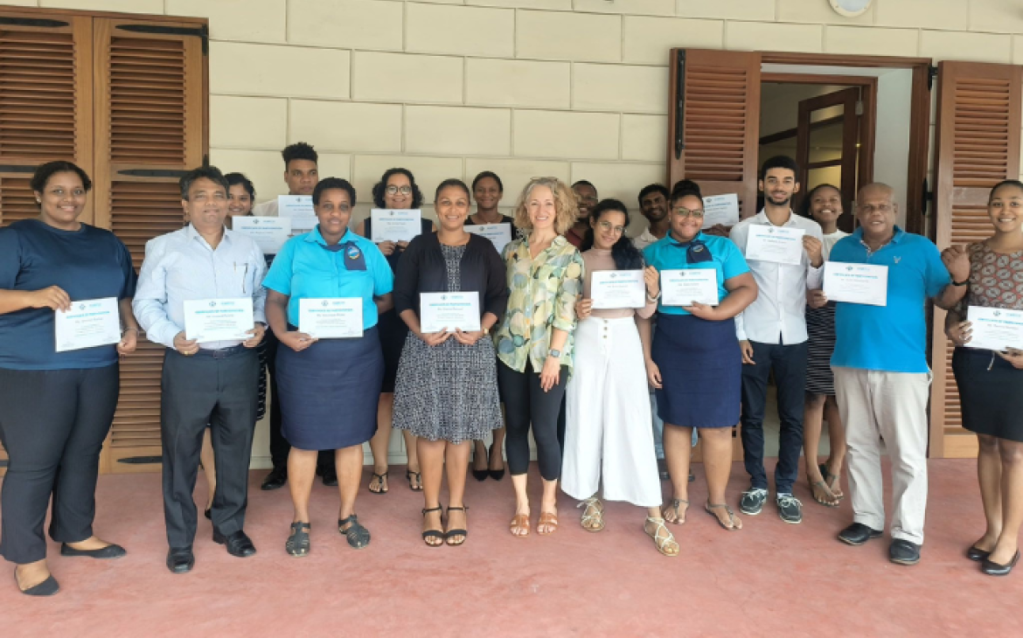
Press Release
05 April 2024
Delivering Stronger, UNited for People, Prosperity and Planet
April 03, 2024: The United Nations Country Team (UNCT) for Mauritius and Seychelles is having their Annual Retreat entitled “Delivering Stronger, UNited for People, Prosperity and Planet” from the 3rd to the 5th of April of 2024 in Mauritius. Bringing together UN agencies and their partners – Government, private sector and civil society - to strengthen cooperation and identify opportunities for new collaboration. This Retreat 2024 is a chance for shared learning and for enhancing UNCT collective engagement to streamline and focus efforts towards achieving national development priorities and Agenda 2030. During the Opening Ceremony at Maritim Hotel, Balaclava Ms. Lisa Singh, UN Resident Coordinator for Mauritius and Seychelles highlighted this as a pivotal moment for the UNCT. It marks the first cycle of implementation of the new Cooperation Frameworks for sustainable development signed last year with the governments of each country. The Resident Coordinator highlighted:“Given the uniqueness of SIDS, many UN agencies have developed and are developing their SIDS strategy to better address their higher-than-average vulnerabilities to exogenous shocks. We also need to go beyond the small states narrative, for SIDS are more than small islands but large ocean states.”Hon. Sylvestre Radegonde Minister of Foreign Affairs and Tourism of Seychelles who joined online underlined:“Through strategic planning and evidence-based approaches…we have the opportunity to affect change for every Seychellois and Mauritian. The loss and damage fund, the multi-dimensional vulnerability index and the outcomes of the forthcoming SIDS4 Conference are tangible steps that will supercharge the breakthroughs needed by us to achieve the shared vision of Agenda 2030 of leaving no one behind. By analysing our challenges and successes we pave the way for the strategic implementation of this Cooperation Framework.”In his opening remarks the Hon. Maneesh Gobin Minister of Foreign Affairs, Regional Integration and International Trade of Mauritius and Government of Seychelles emphasized:“Small Island Nations like Mauritius have unique inherent vulnerabilities which are often overlooked when it comes to resource mobilisation for development. We need to go beyond the GDP per Capita criteria and rapidly devise a vulnerability index tailored specifically for SIDS which will enable small islands to mobilise the adequate resources needed to address the urgent development challenges and the existential threats posed by climate change. This should be a priority at the forthcoming SIDS4 Conference in Antigua and Barbuda.”The panel discussions which are being held during the Retreat with representation from across sectors focus conversation on key headlight issues for each pillar of the Cooperation Framework (People, Prosperity, and Planet). They will provide a platform for strategic dialogue to enhance collaboration across the UNCT to collectively deliver on the commitments made in the Cooperation Frameworks for each country.With less than ten years left to achieve the SDGs, challenges have been clearly identified, and interventions targeted to maximize effectiveness. To that end, the Retreat 2024 for Mauritius will be forward-looking, aiming to catalyse action that is strategic, succinct, adaptable, and results-oriented and which integrates Leave No One Behind (LNOB) as the core unifying principle. WHEN: Wednesday 03 April – Opening Ceremony @9:30 am & Friday 05 April – Closing Ceremony @12pmKEY SPEAKERS: UN Resident Coordinator for Mauritius & Seychelles Ms. Lisa Singh; Minister of Foreign Affairs, Regional Integration and International Trade, Hon. Maneesh Gobin Minister of Foreign Affairs, Regional Integration and International Trade of Mauritius and Hon. Sylvestre Radegonde Minister of Foreign Affairs and Tourism of Seychelles; Mr. Antonio Pedro, Deputy Executive Secretary, UNECA, Mr. Yacoub El-Hillo, Regional Director DCO Africa.
1 of 5
Press Release
19 February 2024
Innovative Approaches to Strategic Planning and Financing for the SDGs
Mahe, Seychelles: On the 19th of February 2024 the Government of Seychelles represented by the Minister of Finance, National Planning and Trade, Mr. Naadir Hassaan launched a weeklong workshop for government officials to build their capacity to use ‘Foresight and Systems Thinking for Strategic Planning and Financing for the Sustainable Development Goals’. The workshop is facilitated by the Office of the United Nations Resident Coordinator for Mauritius and Seychelles in collaboration with United Nations Department of Economic and Social Affairs (UN DESA) and the United Nations Institute for Training and Research (UNITAR).
The Government of Seychelles has identified strategic foresight and systems thinking[1] as two innovative approaches that can help make the most of limited resources and support the necessary investment to build the country’s resilience, from energy transition to climate action to economic transformation, while strengthening the social contract, the education and health systems. Twenty-three representatives from the Ministry of Finance, National Planning and Trade were trained in early February by the United Nations Resident Coordinator’s Office, UNITAR and UNDESA to form a pool of ‘trainer of trainers’ in strategic foresight and systems thinking that will sustain the knowledge transfer in the future. It is these ‘trainer of trainers’ this week who will work in partnership with the UN to build the capacity of 220 policy makers (PSs, CEOs, Finance Officers) from 87 public entities in these innovative approaches. Following the workshop foresight and systems thinking will be integrated in the strategic analysis and prioritization that informs sectoral plans and the budget process in Seychelles.
In his speech for the occasion, Minister Hassan highlighted the importance of this workshop, given the government’s mission to enhance and boost the capacity of public servants to ensure a higher level of service delivery to the general population. “We gather with a shared vision to reinvigorate and refine our internal policies and coordination strategies, aligning them with the priorities of the National Development Strategy and Sustainable Development Goals. This workshop is not just a formality; it is a commitment to empower officials from line Ministries, equipping them with the skills to navigate the intricacies of planning and budgeting."
"By embracing systems thinking and strategic foresight, our aim is to fortify collaboration across Ministries for more effective resource allocation and short- to long-term planning. Let’s not see this just as a gathering of individuals; it is a convergence of minds committed to catalyzing positive change.”
In this way, it is anticipated that embracing systems thinking and strategic foresight will contribute to a more efficient and coherent framework where public finances flow in the same direction avoiding duplication. Importantly, emerging opportunities and risks will be integrated to address the swiftly evolving regional and global development landscape that impact on the citizens of Seychelles.
Find out more here.
[1] Strategic foresight is a “Structured and explicit exploration of multiple futures in order to inform decision making”. Systems thinking focuses on the relationships between the different elements of a system from various dimensions (sectors, levels, space, time), and the perspective of actors (individuals, institutions, collectives), identifying the trade-offs and synergies that form together the political economy of a system. By doing so, Systems Thinking enhances financing targeting efficiencies, reduces transactions costs, and ensures intersectoral coordination and multistakeholder buy-in.
Media Contacts:
Ministry of Finance – Lindy Vital | + (248) 4 382005 | lindy.vital@finance.gov.sc
UN RCO – Janee Connery | + (230) 55009908 | jeshta.connery@un.org
1 of 5
Press Release
24 July 2023
Consultations open in Mauritius ahead of the first major international conference on Small Island Developing States since the pandemic
Port Louis, Mauritius – 24 July: Consultations for the first major international conference on Small Island Developing States (SIDS) since the global pandemic opens in Port Louis, Mauritius on July 24.
At the meeting, the small island nations of the Atlantic, Indian Ocean and South China Sea (AIS) will meet with international partners to review sustainable development progress and propose new partnerships and solutions in advance of the Fourth International Conference on Small Island Developing States in Antigua and Barbuda in 2024.
SIDS are in the crossfires of multiple crises: climate change, inequality and the economic and social repercussions of COVID-19, especially related to debt. COVID-19 hugely impacted all SIDS, especially the collapse in tourism that left large holes in coffers and severely set back efforts to invest in the Sustainable Development Goals, including climate action.
“Small Island Developing States are in the midst of a global crisis,” said Hon. Alan Ganoo, Minister of Land Transport and Light Rail, Minister of Foreign Affairs, Regional Integration and International Trade of Mauritius. He continued, “We must send a collective message reaffirming our determination to address the complex challenges that we face.”
The eight AIS countries—Cabo Verde, Comoros, Guinea-Bissau, Mauritius, Maldives, Seychelles, São Tomé e Príncipe, and Singapore—represent significant differences in exposure to climate change, natural hazards, and global markets. Since independence, some have developed strong economies, but their size and geographies leave them vulnerable to economic and ecological shocks.
Climate-related disasters such as severe storms, floods, and drought have almost doubled over the last 20 years, and they affect SIDS like no other countries. In a sudden-onset disaster, SIDS can lose everything overnight.
SIDS are responsible for only 0.2 per cent of global carbon emissions and yet suffer most from the impacts of climate change. The constant cycle of disaster and recovery leaves them weakened and unable to build resilience.
“The eight SIDS spread between the Atlantic and Indian Oceans and the South China Sea are as diverse as communities can be,” said Li Jinhua, United Nations Under-Secretary General for Economic and Social Affairs, and Secretary-General of the 2024 SIDS Conference. “The United Nations is committed to supporting these islands in their quest for a more resilient and sustainable future. They may be geographically remote, but their problems are not theirs to face alone.”
19 per cent of the coral reefs in the world are in SIDS’ waters. The combined Exclusive Economic Zones of Mauritius and Seychelles – the waters they control – are bigger than the size of India. The meeting will assert that a sustainable future for the planet relies on a renewed and strengthened partnership between all island nations and the international community.
The Mauritius meeting is the first regional review meeting on the path to the Fourth International Conference on Small Island Developing States, taking place in Antigua and Barbuda in 2024. Further regional meetings will be held this summer in Tonga for the Pacific region and in St. Vincent and the Grenadines for the Caribbean. These meetings will be followed by a final interregional gathering in Cabo Verde.
The Antigua and Barbuda conference next year will undertake a comprehensive review of the implementation of the SIDS Accelerated Modalities of Action (S.A.M.O.A.) Pathway, a major international development compact agreed in 2014.
The Mauritius meeting will adopt an outcome document with recommendations that will feed directly into preparations for the 2024 Conference. The meeting will bring together ministers and senior government officials from SIDS across the region alongside representatives of development partners and the UN system.
For more information
UN 2024 SIDS Conference: www.un.org/smallislands
Social media
Please follow any highlights and updates for the 2024 SIDS Conference using the hashtags #SIDS4 and #SmallIslands.
On Facebook: United Nations, Global GoalsUN, UN DESA, OHRLLS
On Twitter: @UN, @GlobalGoalsUN, @UNDESA, @SustDev, @UNOHRLLS Media contact Office of the High Representative for the Least Developed Countries, Landlocked Developing Countries and Small Island Developing States | Conor O’Loughlin | conor.oloughlin@un.org
On Twitter: @UN, @GlobalGoalsUN, @UNDESA, @SustDev, @UNOHRLLS Media contact Office of the High Representative for the Least Developed Countries, Landlocked Developing Countries and Small Island Developing States | Conor O’Loughlin | conor.oloughlin@un.org
1 of 5
Press Release
15 June 2022
First Multi-Sector Policy Dialogue between the Government of Seychelles and the United Nations Country Team
The first Multi-Sector Policy Dialogue between the Government of Seychelles and the United Nations Country Team (UNCT), was held on 19 May 2022.
The Dialogue was organized as an open and constructive exchange between Seychelles’ Ministers and other representatives from both the Government and the UN, in order to reflect on the country’s response to the Covid-19 pandemic and to identify priority areas of support and cooperation for the next UN-Seychelles Strategic Partnership Framework (SPF 2024-2028) in parallel with the country’s National Development Strategy (NDS).
The UN Resident Coordinator expressed the commitment of the United Nations through collective engagement to contribute to Seychelles development aspirations, moving from recovery to sustainable development, with a focus on achieving the Sustainable Development Goals.
The two co-chairs recognised the excellent collaboration that exists between Seychelles and the United Nations, which extends over a broad scope of areas. The delegates exchanged experiences and best practices on possible cooperation on a number of issues of common interest, including the priority areas outlined for the next NDS, namely Transformative Economy, Environment Sustainability, Climate Change, Human Rights, Law and Order, Health, Social Affairs, Education and Culture.
Minister Radegonde and the UNRC Umutoni also acknowledged the role that the United Nations can play in advocating for Seychelles’ priorities and vulnerabilities as a Small Island Developing State (SIDS). Both sides also agreed to work in synergy as a way forward, for the benefit and improvement of the socio-economic development of the country, post COVID-19 pandemic.
Minister Radegonde took the opportunity to reiterate the appreciation of the Government for the continued support of the United Nations Agencies towards Seychelles.
The High-Level Policy Dialogue represents one of the key outcomes of the UNCT Annual Retreat being held in Seychelles from 18 to 20 May 2022.
1 of 5
Press Release
24 May 2022
President Ramkalawan receives United Nations Resident Coordinator
The Resident Coordinator presented to His Excellency her delegation of 10 Heads of Agencies who are in Seychelles to attend the annual United Nations Country Team held in Mahe. The purpose of the strategic retreat is to review work done so far and prepare for the future through a high-level policy dialogue with government. The theme of the UNCT retreat is “let’s walk together beyond recovery to long term development”.
President Ramkalawan extended a warm welcome to the Resident Coordinator and her delegation whilst conveying appreciation of the long-standing strategic partnership between the United Nations and Seychelles and the significant role it played in supporting the country through the COVID-19 crisis. The President also emphasized the importance of moving away from the siloed approach to development and instead working in synergy to ensure efficient utilization of resources for socio-economic recovery.
The UN team congratulated the President on a successful election and for the peaceful transfer of power, and Seychelles’ effective response to the COVID crisis. Ms. Christine N. Umutoni also thanked the President for the opportunity to meet with him to discuss national development priorities. She highlighted the timeliness of the meeting as the UN initiates the process for a new cooperation framework with Seychelles.
Speaking at the request of the Resident Coordinator on behalf of the UN, the regional director for UNESCO, recognized the devastating impact of COVID-19 in highlighting the vulnerability of small island developing states. He identified the importance of economic diversification and emphasized the UN’s capacity to mobilize knowledge and expertise at national, regional and global levels, and to facilitate collaboration and exchange between countries in the region.
Also present was the Minister for Foreign Affairs and Tourism, Mr. Sylvestre Radegonde.
Members of the UN agencies included: Mr. Hubert Gijzen UNESCO Regional Director for Eastern Africa and Representative, Ms. Zebib Kavuma, UN Women Deputy Regional Director for Eastern and Southern Africa, Mr. Frank Turyatunga, UNEP Acting Director and Regional Representative Africa Office, Ms. Amanda Serumaga, UNDP Resident Representative for Mauritius and Seychelles, Mr. Charles Mbuli Boliko, FAO Representative for Mauritius, Seychelles, Madagascar and Comoros, Mr. Coffi Agossou, ILO, Country Office Director for Madagascar, Comoros, Mauritius and Seychelles, Mr. Jude Padayachy, UNAIDS Country Director for Madagascar, Comoros, Mauritius and Seychelles, Mr. Koffi Kouame, UNFPA Representative for Madagascar and Country Director for Comoros, Mauritius, and Seychelles, Dr. Rex Mpanzanje, WHO Representative for Seychelles, Ms. Celine Lemmel, IOM Head of Mission for Mauritius and Seychelles, Ms. Janee Connery Communication and Advocacy Officer at RCO.
1 of 5
Latest Resources
1 / 11
Resources
27 November 2023
1 / 11

